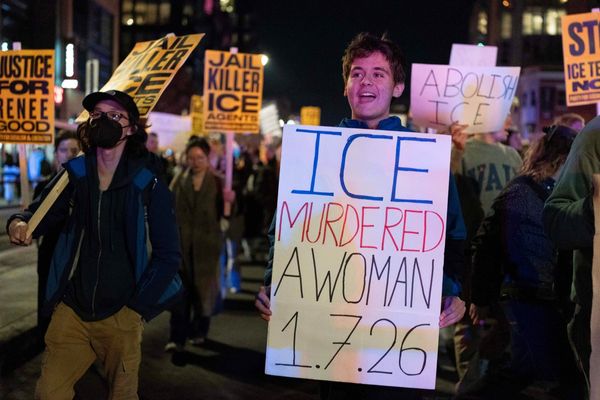
It was the interview that destroyed Thatcher. Three days after the furious resignation of her chancellor Nigel Lawson in October 1989, she went on TV for a 45-minute interview with an unlikely confidant of hers – Brian Walden, the Labour MP turned ITV journalist. She was ready for him, but she also trusted him: it wasn’t their first rodeo together. It was, however, emotionally intense.
“I think so many of his questions are beseeching,” says James Graham, the celebrated writer of Sherwood and Brexit: The Uncivil War, who has turned it into new drama Brian and Maggie, starring Steve Coogan as Walden and Harriet Walter as Thatcher. “Just say that you get it. Just say that you were wrong, just say that you’re not flawless. And if you do that, grab my hand and I’ll save you.” Saving her is the opposite of what happened.
People argue about that. Some say she was holed under the waterline as soon as Lawson resigned due to her taking counter-advice from her economics adviser, Prof Alan Walters. Others think she could have survived if her own MPs hadn’t been such snakes – who would have gone after her regardless. But this interview was where her aspect changed, from determined to brittle, and you could see the self-belief seep out of her face, rendering her not a fragile human but something far less relatable: someone defensive.
Walden and Thatcher’s friendship was surprising on paper – they were from opposing parties – but not really. Walden is what we’d probably call Blue Labour now; he’d grown up in a trade union tradition that was trenchant and punchy. Class war wasn’t the problem; his problem was that he didn’t like the new language of rights and social justice and a conception of the working class as needy. Graham, who’s from Kirkby-in-Ashfield in Nottinghamshire – always Labour, now Reform – describes that tension on the left in the 80s: people who believe in “public institutions like the NHS but are also socially conservative, with a ‘Got to work hard, don’t give me anything, I’ll make my own path’ attitude … it’s a very particular tradition I find really fascinating.”
Thatcher was similarly conflicted, a radical Joan of Arc warrior for the establishment who loathed its (fair play to her) often talentless scions. “She had this strange ambivalence with men,” says Harriet Walter. “She despised so many of them of a certain class, but also enjoyed flirting with them, enjoyed a certain kind of game she could play with them.” Thatcher saw Walden as an equal, and that was rare: their friendship was a late-night whisky deal where they understood one another on a level deeper than monetarism – until that fateful broadcast.
Brian and Maggie is taken from a chapter of current affairs producer Rob Burley’s book Why Is This Lying Bastard Lying to Me?, in which he looks at mould-breaking political interviews. Burley took it to Coogan, who took it to Graham to see if he’d write the drama. He “more or less said ‘yes’ there and then. Which surprised me. I thought there was going to be more wining and dining.” Coogan sounds almost miffed at the lack of courtship, but I am speaking to him from his dressing room between performances of Dr Strangelove in the West End, so he may just be hungry.
The drama blasts you with a complicated yearning for the past – the look is powerfully 80s, dishevelled and charming, but what you immediately miss from that era is the sheer seriousness. “I hope it asks a big, important question, without inflating the scale of it,” says Graham. “This instrument of democracy, the political interview, is in crisis. We really need to talk about that, talk about talking, have a conversation about conversations and why they’re not as fulfilling and satisfying and illuminating as they used to be.”
He floats a number of completely plausible theories: no minister, let alone prime minister, would do a 45-minute interview any more. Would a broadcaster even ask for one? When politicians submit to five minutes, they do it trained to the teeth, always looking to pivot away from the question, with “I think what the people of this country really want to hear is … ” Graham is understanding: “Politicians are just shitting it all the time, because of the potential for something to be clipped and shared and weaponised.”
But Coogan’s view is that they don’t only avoid substance for fear of misinterpretation. “Look at Keir Starmer now; they all just tiptoe around every fucking subject so they annoy the least number of people possible,” he says. “It lacks any kind of backbone or vision. It looks like some sort of marketing spreadsheet being spewed out. No one says anything they actually mean any more. I have no idea what any politician in the Labour government actually thinks. If they have any compassion or strong motivation, it gets absorbed into the mush of a politics that isn’t really about anything.”
Margaret Thatcher “actually heard the question, listened to it, responded in real time with her own words”, Graham says, “like how human beings do. They don’t seem capable of doing that any more.” Also, say what you like about her but “she would sit there going: ‘No one’s going to like this, but here is some harsh medicine that people need to take. This is what I think we need to do and here’s the reasons why, based on this particular evidence’ – how refreshing is that! She’s actually saying the unsayable.”
It is a fascinating aspect of the drama that everyone involved in it hated the Thatcher years, which I’m using as polite code (even now!) for Thatcher herself. Walter’s acting was fluid with her activism in those years: “We went up and supported the miners’ strike, doing a cabaret for the striking miners and staying in their houses and helping them with the food handouts, all sorts of chanting, ‘Maggie, Maggie, Maggie, out, out, out’, she was absolutely a fiend. So when I was first told ‘You’d be great as Margaret Thatcher’, I was rather insulted.”
Coogan “was a young man, we were a lower middle-class household, educated Labour people, we did not like Margaret Thatcher at all. Me, James, Harriet, we all had this natural antipathy towards her, but we did not want it to be a polemic, or a character assassination.” Acting is like law, Walter says: you have to be able to argue both sides. Graham, who already got it in the neck from Remainers for humanising Dominic Cummings, is braced for “all those people who hated me for Brexit [The Uncivil War] coming at me for this”.
Finding Thatcher’s beating heart requires an element of revisionism, and that’s fair enough: some of her unpopularity wasn’t really about politics. “What I found unsympathetic about her at the time,” says Walter, “was her unyieldingness, her tunnel vision, her blinkeredness. And now I think, wait, that’s rather a misogynist statement.” Some 80s standards were quite bizarre in retrospect. People talked about Thatcher as this mess of contradictions: she was rigid, she was flirtatious, she was the Iron Lady, she had a mischievous twinkle. Women were such an aberration in public life that there was only space for them to be one thing. Nobody would ever have said: “What the hell is it with Ken Clarke, sometimes he’s serious, sometimes he’s funny.” And yet, as human as Thatcher was, she also left scars so deep on civic life that no amount of humanising can fully describe her impact.
This is what makes the dramatisation of this interview perfect: Graham describes it as “a pocket of history that sort of sits adjacent to the main story”. Walter’s Thatcher, I think, may be my favourite and there have been tons (Fenella Woolgar in Handbagged, Gillian Anderson in The Crown). She is hubristic and callous, exquisitely but bearably poignant. Somehow, Walter’s fight to make three dimensions out of a politician she knew as a 2D villain gives real heft and conflict to the part.
Coogan’s Walden, meanwhile, is devastated by his own betrayal. Thatcher never spoke to him again, and he kissed goodbye to a knighthood. Years later, though, a journalist asked him, after a conversation about the Thatcher takedown, for his biggest regret, and he said: “I wish I’d been born in ancient Greece or Rome.” So he must have got over it.
Graham says: “If you watch the real interview, he says the word ‘love’ to her, and his voice breaks when he says it: ‘because people do love you.’ And he breaks, and he wobbles, and she’s staring at him, staring back at her. And what’s thrilling is that it’s two people just behind their eyes, going: ‘What are you doing?’ And smiling, because the cameras are rolling.”
Five weeks after that interview, Margaret Thatcher was challenged for leadership by a stalking horse candidate, Anthony Meyer, who didn’t have a chance but the 60 votes against her changed the vibes. “Whether she would have fallen eventually or fallen in a different way, on a different timeline, is up for debate,” says Graham, “but this was an example of an interview taking place, the country watching it, things being said and modern British history turning a little bit.”
Brian and Maggie starts later in January on Channel 4.







